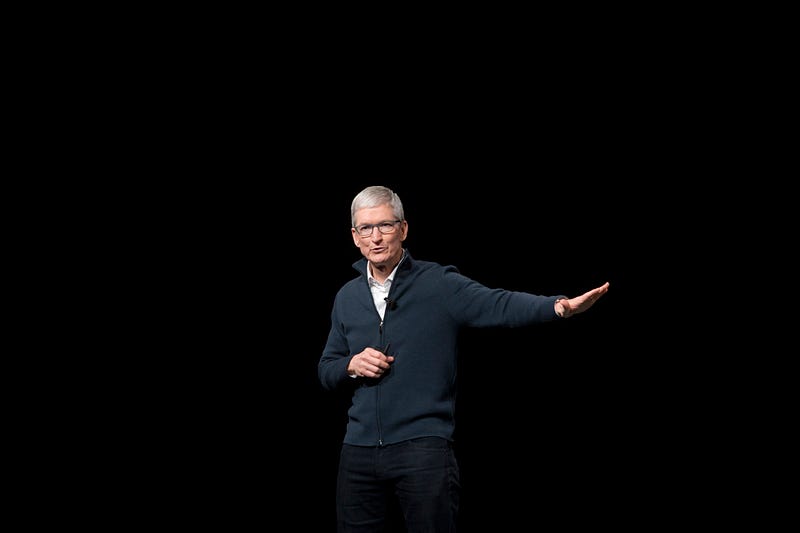Tim Cook's Stand: Can He Resolve Facebook's Privacy Crisis?
Written on
The Escalating Tension Between Apple and Facebook
The ongoing rivalry regarding user data and privacy between Facebook and Apple is intensifying. How far is Tim Cook willing to go in this battle?

Tim Cook, the CEO of Apple, has declared privacy a “fundamental human right” and has previously criticized Facebook and Google for their handling of user information. Recently, he has taken on an unexpected role as a de facto privacy regulator for Facebook.
On Wednesday, Apple officials targeted Facebook for breaching Apple’s guidelines through a research application that allowed Facebook to monitor users’ online activities. This app was distributed via a program meant for trusted developers, which allows testing without the usual App Store approval. Consequently, Apple revoked Facebook’s access to its internal apps and updates, leading to significant disruption among Facebook’s development teams.
This incident underscores the escalating conflict between the two tech giants over privacy issues.
The Role of Tim Cook as a Privacy Enforcer
Cook's firm stance on privacy could position him as a last-resort regulator in the tech industry. By leveraging the power of Apple's iOS, he could compel software developers to adhere to privacy standards or risk losing access to millions of iPhone users.
The latest clash arose after TechCrunch unveiled Facebook's Project Atlas, a program that incentivized users with $20 for installing the Facebook Research app on Apple devices. This initiative allowed Facebook to track a range of user activities, from app usage to online purchases.
However, Facebook sidestepped Apple's standard installation procedures through a method called side-loading, which is reserved for internal testing within organizations enrolled in Apple’s enterprise developer program.
Apple’s Response to Facebook's Breach
In response, Apple terminated Facebook's enterprise developer access for all its applications, not just the problematic research app. An Apple spokesperson stated, “Our Enterprise Developer Program is designed specifically for internal app distribution within an organization.” They emphasized that Facebook misused its membership to distribute a data-collection app to consumers, breaching their agreement.
Despite Facebook reporting robust earnings, the company is currently negotiating with Apple to regain its developer access. A spokesperson for Facebook opted not to comment on the matter.
On the same day, TechCrunch disclosed that Google operated a similar research app, Screenwise Meter, which it subsequently disabled, acknowledging it should not have functioned under Apple’s developer program.
The Implications of Apple's Actions
Apple’s decisive measures reflect its commitment to privacy. However, if Cook genuinely aims to safeguard Apple users from privacy-invasive applications, he might consider removing all Facebook products—such as Instagram and WhatsApp—from the App Store until Facebook demonstrates a commitment to user privacy.
Such a ban would be a drastic measure, akin to a declaration of war against a significant competitor. Yet, Apple has previously enforced penalties for lesser infractions. In the absence of governmental regulations, this might be the only effective means to ensure compliance from Facebook regarding privacy standards.
Would this tactic serve as a deterrent? Definitely. Reports indicate that revoking Facebook’s developer certificate has created a “critical problem” for the company’s developers. With hundreds of millions of users accessing Facebook on iPhones, losing App Store access could substantially harm Facebook's financial health.
Would this approach be justified? Certainly. Facebook's history of privacy violations is concerning, with executives previously caught scheming to access Android users’ call and text logs without proper permissions. Additionally, Facebook’s Onavo VPN app was removed from the App Store for excessive data collection.
Could this crackdown backfire on Apple? It’s a possibility. Facebook's applications are among the most popular on Apple devices, and some iPhone users might consider switching to Android if deprived of access to their feeds. However, this transition would likely be gradual.
Ultimately, given Facebook’s heavy dependence on Apple’s ecosystem, it’s probable that Facebook would quickly adapt to regain compliance with Apple’s requirements.
Is such a significant measure necessary? It appears so, if Apple is earnest about protecting user privacy. History has shown that Facebook cannot be relied upon to ensure user privacy without external pressure. While regulators have imposed fines, these often lack substantial impact; typically, Facebook pays a nominal amount and continues business as usual.
Concerns Over Apple's Power
Would penalizing Facebook constitute an abuse of Apple's authority? Arguably, yes. The control that Apple and Google wield over the tech landscape through their operating systems raises concerns. Moreover, Apple's own privacy record has not been flawless; recently, they had to disable the FaceTime feature due to a bug that compromised user privacy.
However, aggressive tactics among tech companies are commonplace. For example, Facebook frequently restricts data access for competing applications. Until government entities impose regulations on tech giants, inter-company regulation may be the most effective approach to mitigate excessive practices in the industry.
It is concerning that Apple could unilaterally penalize a rival for privacy infractions. Yet, Apple established rules for developers, which Facebook violated, and is now facing consequences.
Apple’s advocacy for user privacy, while undoubtedly self-serving, ultimately benefits its users and could stimulate change across the tech sector. If Cook is determined to confront app developers who consistently breach user trust, focusing on the largest offender—Facebook—might be the necessary first step. A forceful intervention from Apple could prompt Facebook to reassess its practices regarding user privacy.
For more great stories, subscribe to The New York Times.
© 2018 New York Times News Service